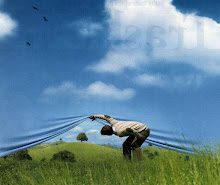\im-PLAK-uh-bull\, adjective:
Not placable; not to be appeased; incapable of being pacified; inexorable; as, an implacable foe.
~~~~~~~
All humans are, by nature, self-reflecting. Some are far more than others, and some do so only minutely, but I think there are few who would claim it not a part of human nature to not merely experience life, but consider it—however deeply or shallow. This trait, however, undermines all of the others—cooperative natures can be convinced to be competitive, selfish ones to be compassionate—and leaves us with a seemingly muddled idea of human nature.
While it may seem that way, I am inclined to believe otherwise, and will post later in the week more in-depth on the matter. However, the point that I want to make now is an optimistic one—that no matter what our natures can be sensibly defined to be, it is impossible to lose hope in humanity, as I think it impossible that self-reflection is not a part of that nature. Whatever positive or negatives natures we have (and this seems almost contradictory to the idea of finding a “nature” in the first place), we can change, we can learn better, and we can act better.
Thus, the reflective nature of human nature may be the only relevant, or at least the most important, part of our natures.
Tuesday, October 7, 2008
Subscribe to:
Post Comments (Atom)


No comments:
Post a Comment